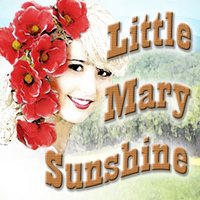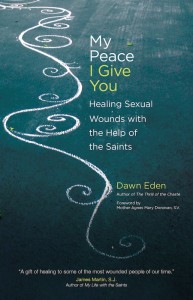Catholic World Report today features an interview with me by John Burger in which I talk about why the Catholic Church, and all society, needs to reach out to victims of childhood sexual abuse, a need that is particularly visible in this week’s news stories on Dylan Farrow and Ryan Loskarn. I also speak about the healing witness of saints who suffered childhood sexual abuse, which is the topic of my book My Peace I Give You: Healing Sexual Wounds with the Help of the Saints, and I share how, as a Jewish convert to the Catholic faith, I discovered the meaning that Christ’s glorified wounds have for my own wounds:
Here are some quotes from the interview:
CWR: How can saints help a person overcome the effects of abuse?
Eden: I would say the most common toxic effect of childhood sexual abuse is the misplaced guilt that the child is likely to carry throughout life unless the victim makes a concrete and persevering effort to counter it. Children tend to blame themselves for the evil that others perpetrate upon them. In some ways this misplaced shame and guilt is a survival mechanism, because if the child is abused by a parent or guardian, or if a parent or guardian in some way is enabling the abuse by not protecting the child, then the child may still think, “As bad as my situation is, if this guardian goes away, I will have nobody to protect me.” So, subconsciously, the child thinks, “Therefore I can’t blame my parents or guardian; I have to just blame myself and say I must have wanted it.”
When the adult who has internalized this misplaced guilt learns there is a saint who suffered similar wounds and whom the Church now acknowledges to be in heaven, then the adult can begin to feel free of this guilt and realize “I couldn’t have been responsible for this abuse. This abuse could not have been my sin.”
* * *
CWR: What can the average Catholic do if he or she encounters someone struggling with a past marked by sexual abuse?
Eden: The first thing is to weep with those who weep. Normally, our first instinct is simply to solve the problem, to push the person to look beyond their pain. But it’s much more helpful to really be present for the person who is suffering, to acknowledge their pain, to affirm that what was done to that person was wrong.
Second, and very importantly, we should pray for that person. And third, when the person is ready, we can do what’s in our power to help that person find both a competent spiritual director who has experience with victims of abuse, and a therapist, preferably a Catholic therapist. In my book, I do recommend both therapy and spiritual direction for victims, and I emphasize the importance of finding a therapist who either is Catholic or at least respects one’s Catholic faith.
* * *
CWR: You became a Catholic in 2006, at the height of the sexual abuse scandal. Was that a hurdle for you, in coming into a Church that was depicted in the media, at least, as full of abusive priests and enabling bishops?
Eden: It did at first make me suspicious of the Church, which is one of the reasons why I delayed entering, because I received Christian faith in 1999, and the scandal broke in 2002. I remember asking Catholics at the time of the scandal about how they could be part of a Church that had these evils within it, and I remember being surprised by the response of my Catholic friends, that they were just as furious about the abuse as anyone. From the way the news reported things, I had just assumed that all Catholics were like Bill Donohue [president of the Catholic League for Religious and Civil Rights], simply circling the wagons and assuming that every single accusation against a priest had to be a malicious lie invented by the media or people out to get money from the Church.
So, learning that Catholics themselves were grieving over the abuse itself—not just grieving that the abuse was exposed but that it had actually taken place—helped me become more open to entering the Church.
What really won me was the Church’s consistent witness for the dignity of human life, because abuse is a very soul-destroying experience. It’s a kind of murder. For someone to abuse another person—especially to abuse a child—the abuser has to, in his or her heart, really deny the humanity of this child and just look at the child as an object. So when I saw the Church’s love for human life at every stage, particularly the Church’s unceasing affirmation of the dignity of life in the womb, that was what made me realize that only the truth proclaimed by the Church was capable of protecting children from abuse. The fact that sinful, fallen human beings who are members of the Church yet disobey God’s law does not take away from the truth of the law as proclaimed by the Church.
* * *
CWR: What are your thoughts on how the Church has responded to the problem of abusive clergy and the cover-up that took place in various dioceses?
Eden: I think there are certain aspects of the response that are very good; for example, the emphasis that any and all abuse by a representative of the Church needs to be reported, not only to the Church but also to the proper authorities.
I think that also there are certain elements of the Dallas Charter for the Protection of Children and Young People that are very positive and needed, such as that a diocesan commission needs to investigate any and all claims of abuse.
At the same time I believe that so much more needs to be done. For one thing, recent cases such as occurred with Bishop [Robert] Finn [of Kansas City, Mo.] show that we need to follow what rules we have in place. This also came up with the recent case with the archbishop of Minneapolis-St. Paul [according to local media reports of failures by the archdiocese in dealing with clergy who sexually abused children]. We badly need to follow our own rules because the rules are only as good as the observance of them.
What little outreach we’ve had to victims needs to be dramatically improved. First of all,as was pointed out by a victim at the first Vatican conference on abuse, which was held in 2012, it’s very important that we offer spiritual help to victims. Right now, if someone contacts the victim assistance program of a diocese, the victim will be offered psychological help but very little, if any, spiritual help. If we’re not offering spiritual help, we’re not being Church because anyone who is a victim of evil needs to know that God did not will that evil for them, and that God loves them. And how much truer is this for someone who’s been abused by a representative of the Church. So much improvement needs to be done in the area of spiritual help.
Secondly, what little outreach we have to victims is mostly to victims of clergy abuse. It’s understandable that that should be our first priority, but it shouldn’t be our only priority. Here, Bill Donahue is right, in that while we should not at all minimize the grave evil of clergy abuse, it’s true that only a tiny percentage of child sexual abuse is committed by clergy or religious. About half of all childhood sexual abuse takes place in the child’s own home, and the rest of the abuse takes place usually in the private home of a neighbor or family friend or is committed by a teacher or someone else who has the opportunity to be in close proximity to the child, or by a peer.
So if we’re only reaching out to those people who have been victims of clergy abuse, we’re failing to bring the healing of Christ to a large number of people who need it.
Now the statistics on sexual abuse are very under-reported because of the misplaced guilt and shame associated with such abuse. They’re also under-reported because given the comprehensive sexual education that we now have, children are taught from an early age that it’s natural for them to act out sexually. So many people grow up being abused who don’t even mentally write what was done to them as abuse. So when you hear the statistics, which are still quite high—that one out of four women and one out of six adult men report having been sexually abused in childhood—you have to wonder if those numbers aren’t higher, which, I’m sure they are.
And second, those numbers only refer to what is referred to as contact sexual abuse. There are a far greater number of people who have been victimized in childhood by non-contact sexual abuse, such as exposure to pornography, intentional exposure to adult nudity or to graphic sex talk. These things all can have lasting toxic effects when perpetrated upon a child. Just think about some of the things children see on television, including all the sexual violence that you can see day or night on TV. We’re a culture that has grown up with deep wounds. If the Church is going to be Church, we have to come up with a vocabulary for affirming that people are wounded, and pointing them toward the healing that can only be found in Christ.
Read the entire interview at Catholic World Report, where you will also be able to leave a comment.
My thanks go out to John Burger and all at Catholic World Report for giving me the opportunity to speak about abuse and healing. two words that we need to see appear together in the media much more often than we do.
I am now returning to my Patheos blogging hiatus, but post occasional updates about my tour dates and media appearances on The Dawn Patrol.











